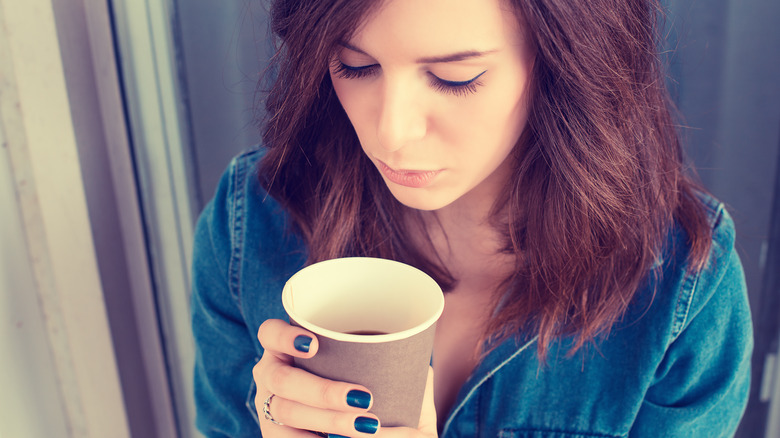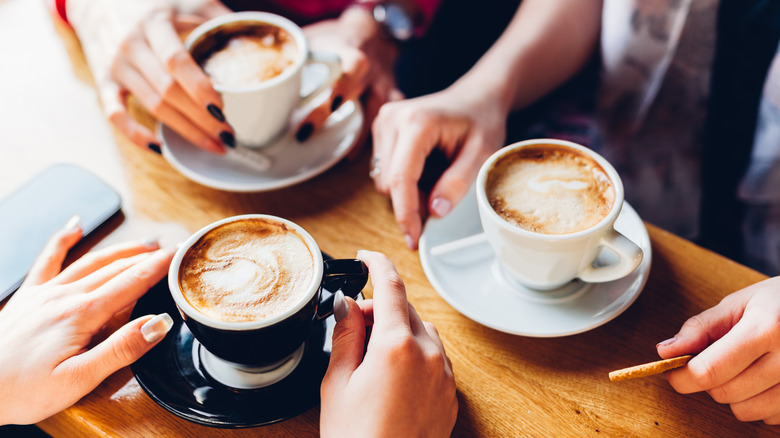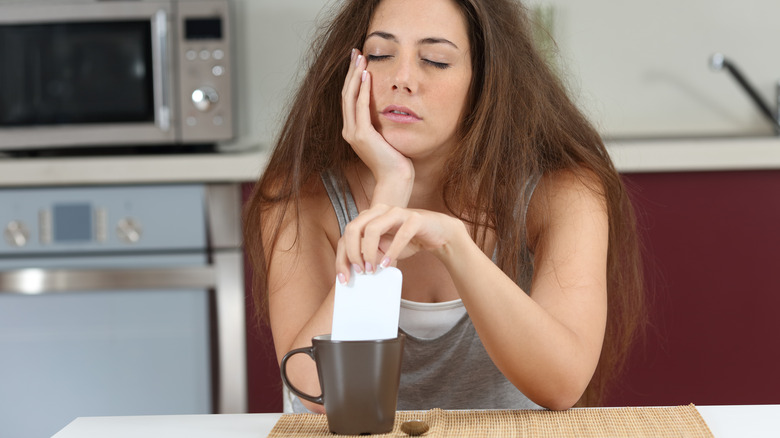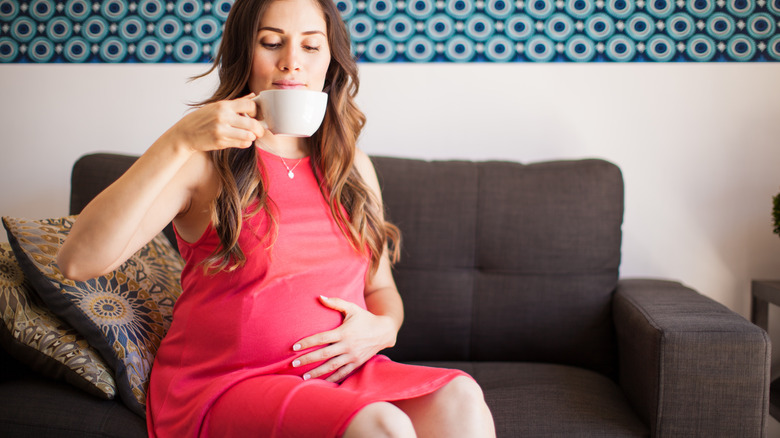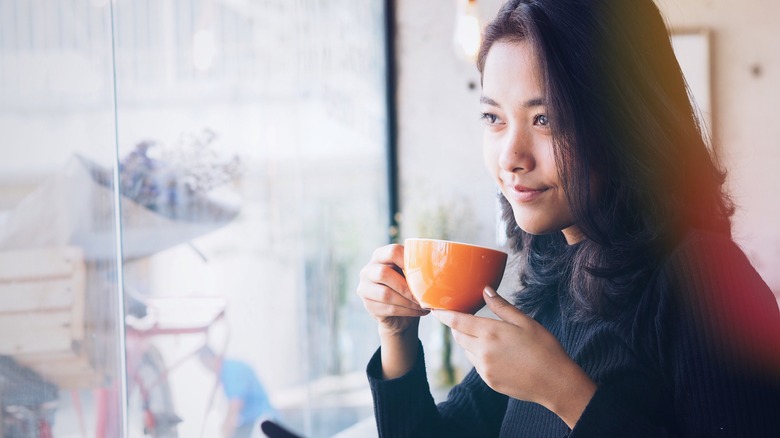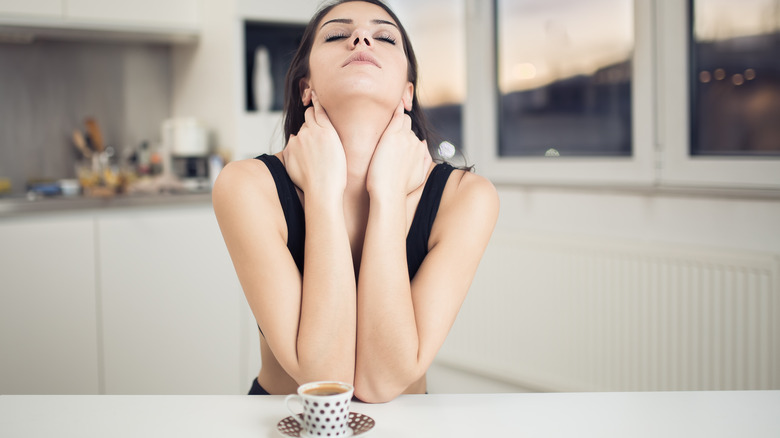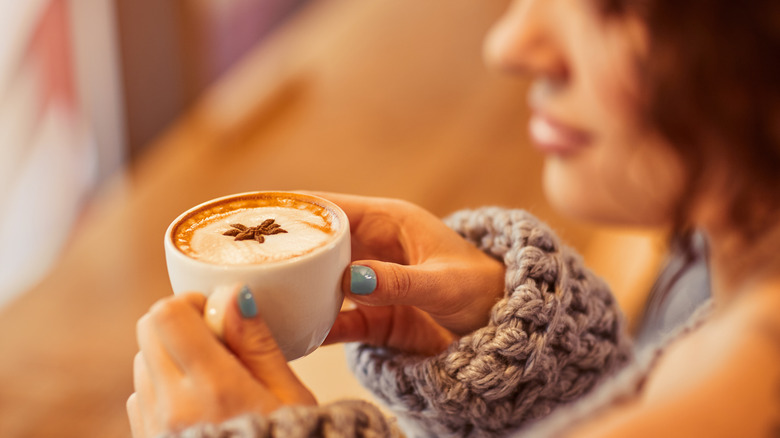What Really Happens To Your Body When You Drink Coffee
An estimated 80 percent of Americans drink coffee. It's the second most traded commodity on Earth. Which makes sense, because coffee tastes great and gives you energy.
I love my coffee. I start every morning with a nice cup of cold brew. Have you ever wondered what actually happens to your body when you drink coffee? I went to the experts to find out.
You get happier
There's a reason so many people start their day with coffee — because it actually makes you happier on a chemical level. Psychotherapist Dana Carretta told me in an interview how this happens. "Dopamine, the feel good hormone, is prevented from getting reabsorbed into your blood stream. The result? You feel happier." She continued, "Since the caffeine causes this effect on dopamine levels, it also explains why coffee can be so addicting. Any type of drug that produces an effect on the 'happy three hormones' (dopamine, oxytocin, and serotonin) are likely to make us crave more and more of it."
Before you do a celebratory dance and drink a gallon of coffee, you should know that this increase in happiness only occurs when you drink coffee in moderation. Abbey Sharp, RD, founder of Abbey's Kitchen, told me, "Caffeine stimulates the release of our feel-good hormone dopamine, so research has linked it to a reduced risk of depression. Having said that, excessive coffee consumption may lead to increased anxiety and restlessness, so stick to one to three cups per day."
You go into fight or flight mode
Fight or flight mode is one of the main physical results of drinking coffee. This creates a lot of different symptoms, including increased heart rate and sharpened focus. Dr. Svetlana Kogan, M.D., told me, "When we drink coffee, our heart rate goes up and the blood pressure goes up. Mentally, we enter a 'fight or flight' state, in which our senses and focus are sharpened."
Gina Keatley, CDN told me,"After about three hours of having that cup of coffee the effects of the caffeine start to diminish. The feeling of energy you have starts to decrease, not because you have less energy but because your body is leaving the fight or flight mode it was in prior." If you find your energy dipping later in the day, it could very well be a result of your cup of coffee in the morning.
You can see better
If you wake up blurry eyed and then feel like your vision improves after your cup of coffee, it's not your imagination. Improved vision is one of the positive effects of fight or flight mode. Dr. Alex Roher, M.D., told me, "Within 20 minutes of drinking coffee, the caffeine causes adrenaline to be released. As a result, your pupils dilate slightly and you might actually have sharper vision."
Melissa Hooper, MS, RD, expert registered dietitian and nutritionist, agreed. She told me, "Caffeine triggers the sympathetic nervous system to increase natural production of adrenaline, which may cause increase in mental alertness, and lead to improved vision as the pupils dilate slightly."
You spend more time in the bathroom
If you're drinking coffee on a first date, you might want to take it slow — the coffee drinking, that is. Coffee makes you have to go to the bathroom, and you don't want your date waiting around while you take multiple trips to the ladies room.
Hooper told me, "Caffeine and the naturally occurring steroid compounds in coffee stimulate the bladder and the bowels, causing frequent trips to the bathroom. The caffeine is a diuretic, which increases urinary production, and thus urinary output. It also causes the bowels to work more efficiently, and in some extreme cases can cause diarrhea and problems for people with irritable bowel syndrome."
You breathe more easily
Multiple studies on the effects of coffee on asthma have shown that drinking coffee makes it easier to breathe. Sharp told me, "Caffeine contains an agent known as theophylline that plays an important role in lung health. Theophylline is found in drugs to help open airways in the lungs to relieve symptoms of asthma. One study found that even small amounts of caffeine can improve lung function for up to four hours."
This research goes way back. In 1993, a physician at Harvard University found that coffee helped the muscles surrounding the bronchial passages to relax. He studied the effects of tea and soft drinks as well, but coffee was the only drink that had that muscle relaxing effect.
You have a hard time sleeping
Coffee may give you sleeping problems, especially if you drink it too late in the day. Dr. Carolyn Dean, nutrition and diet expert, told me, "If you are wired, you can't sleep and if you do it's not deep, refreshing sleep."
Nutrition coach Amanda Sauceda agreed. She added, "Coffee can have effects on getting a good night's rest. Coffee can decrease our sleep quality and this can cause a viscous cycle of not sleeping well and reaching for more coffee the next day."
Apovian told me that while she tells her clients to drink one to two cups of coffee a day, "It takes about eight hours for your system to fully metabolize caffeine, so I recommend cutting off coffee consumption after noon to make sure it will not interfere with a full night's sleep, which is crucial for muscle repair, appetite control, and a healthy metabolism."
It's harder to get pregnant
Too much coffee can make it harder to conceive, and harder to keep your pregnancy once you are pregnant. Hooper shared with me, "Coffee can reduce fertility in women trying to conceive by impairing ovulation and can also increase risk of miscarriage if too much is consumed. The recommendation is to keep coffee (or caffeinated beverages) intake to two cups or less per day if trying to conceive, and some doctors say none at all."
As reported by TODAY, one study found that women who drank three or more caffeinated drinks a day before pregnancy were almost twice as likely to miscarry early on. Not the best news for coffee lovers who are trying to get pregnant.
Your workouts improve
If you dread going to the gym, try drinking some coffee before you go to work out. Dr. Caroline Apovian, director of the Nutrition and Weight Management Center at the Boston Medical Center, told me, "Consuming caffeine just before a workout has a few surprising benefits. It temporarily increases your endurance, leading to a higher intensity workout than you would experience otherwise, and also increases dopamine levels. This both decreases sensations of pain and increases enjoyment, leading to a longer workout and a greater likelihood that you'll exercise more often."
Beth Witherspoon, registered dietitian consultant for Community Coffee Company, agreed. She told me, "The all-natural caffeine in coffee has been associated with improved physical performance, especially in aerobic or endurance exercise. The amount of caffeine studied to produce this effect is found in about one to four cups of regular brewed coffee for someone weighing 150 pounds."
You get smarter
Caffeine makes you feel more focused and alert. Hooper told me, "The caffeine acts as a stimulant and may increase mental functioning. The brain sends out neurotransmitters, which impacts cognition. Caffeine strengthens the neurotransmitters, helping them to function more efficiently, improving mental function and ability to concentrate."
Sharp explained the chemical effect behind your improved focus. She told me, "Caffeine is considered a "brain stimulant" and blocks the receptors for a chemical known as adenosine — if adenosine is blocked, other chemicals can flow more freely which gives you a surge of energy and allows you to focus better (which can improve mental performance!)"
Sharp added that coffee also makes you smarter because it improves your long term memory. She said, "Research suggests that coffee may have a positive impact on long term memory. Caffeine enhances certain memories at least up to 24 hours after it is consumed.."
If you drink too much, you'll get anxious
Drinking too much coffee may increase your anxiety levels. Carretta told me, "From a psychological perspective, someone who already struggles from anxiety or a history of trauma will experience an increase in their symptoms if they drink a lot of coffee. Short-term, the coffee probably helps because the caffeine provides a quick pick me up and a brief increase in the level of happiness. But once that caffeine wears off, the symptoms (fatigue, depression, anxiety) are likely to come back even stronger."
Sandie Gascon, Functional Diagnostic Nutrition Practitioner & Holistic Healing Coach, agreed. She warned, "Over time you will need more and more coffee to produce the same effects. By increasing dopamine you will deplete serotonin. This leads to depression and anxiety." If you find yourself feeling anxious without knowing why, cut back on your coffee intake. You might miss that fourth cup of coffee in the afternoon, but you'll feel better overall.
Drink in moderation
One of the key takeaways from the experts is to drink coffee in moderation. Sharp told me, "Enjoying coffee in moderation is shown to carry many benefits, however drinking excess amounts of coffee can lead to tremors, sleeping problems (since it's a stimulant), anxiety and stress."
Dr. Dean agreed. She told me, "Coffee is addictive. You know you're addicted when you go without your morning wake up drink and you get a low grade headache, which is relieved when you grab a cup of coffee the first chance you get. Being addicted to anything is not a healthy behavior."
A myriad of benefits
Coffee provides a lot of benefits in addition to the ones I've shared above. Hooper told me, "The most recent dietary guidelines now say that three to five cups of coffee a day can be part of a healthy diet and are good for health due to research that indicates moderate coffee consumption may have positive health effects, such as reduced heart disease, reduced cancer of the liver, prostate and breast, reduced risk of Alzheimer's, reduced risk of type 2 diabetes, increased mental function/alertness and reduced depression."
The bottom line? Enjoy your coffee and the benefits it provides, but take care of yourself and know when to stop drinking coffee and reach for your water bottle, instead.

